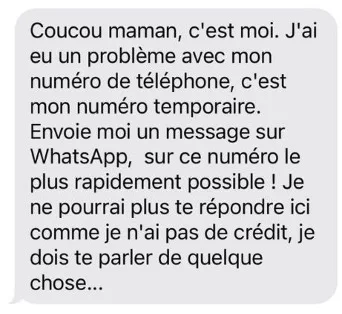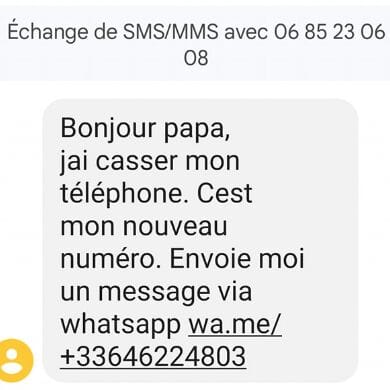Hi Mum/Coucou Maman – fake text messages
Son or daughter at uni or working in another region or country? Worry about them losing their phone or getting into financial trouble?
Well, of course we’re always on the alert for our kids no matter how old they are.

So when you receive a text saying they have lost or damaged their phone, please text them back on XXXXXXX new number, the maternal or paternal instinct kicks in and it’s only natural to text right back before you think.
However, the ‘Hi Mum’ or ‘Coucou Maman’ scams, not new, have reared their ugly heads again.

The sender claims to have lost or broken their phone and requests you message them back, on a new phone number or via another app, designed to trick you into handing over money or financial information to a scammer on the belief that you are communicating with a loved one.

DO NOT REPLY IN ANY SHAPE OR FORM. Obvious to some but not to all as this scam has claimed many many victims.
If you’re concerned, call your relative on the usual number, call one of their friends, text…but do not reply!
HOW DOES IT WORK?
Once you have replied to the text as requested, the next request will usually be for money, or for help in making a payment to pay for a new mobile or add some credit:
“I need to pay for a new phone – can you send money to me via this link? I promise I’ll pay you back next week.”
Warn Grandma, another easy victim.
THE CLUES
- The sender has an unknown mobile phone number
- The message describes an urgent or emergency situation and requests immediate help
- The message is not signed with your child’s name
- An acceptable and believable reason is given for the strange mobile phone number e.g., “I dropped my phone in the sea.”
- You are asked to reply on a messaging app such as WhatsAp
- Once you reply to the message, you are asked to transfer money
- The messages often contain spelling mistakes or grammar mistakes
 WHAT SHOULD YOU DO?
WHAT SHOULD YOU DO?
Don’t reply
Check with relative by usual means of communication
Block the number
Scammers often find personal information on social media platforms. Never post personal details such as email address or phone number on public internet.


It’s going on in the UK too. Two neighbours in my retyirement block of flats had similar calls., but their grandchildren had” lost their cards to get money out of their accounts”Luckily neither of my friends banked on line do they went to their banks to arrange to send money and were alerted to the scam